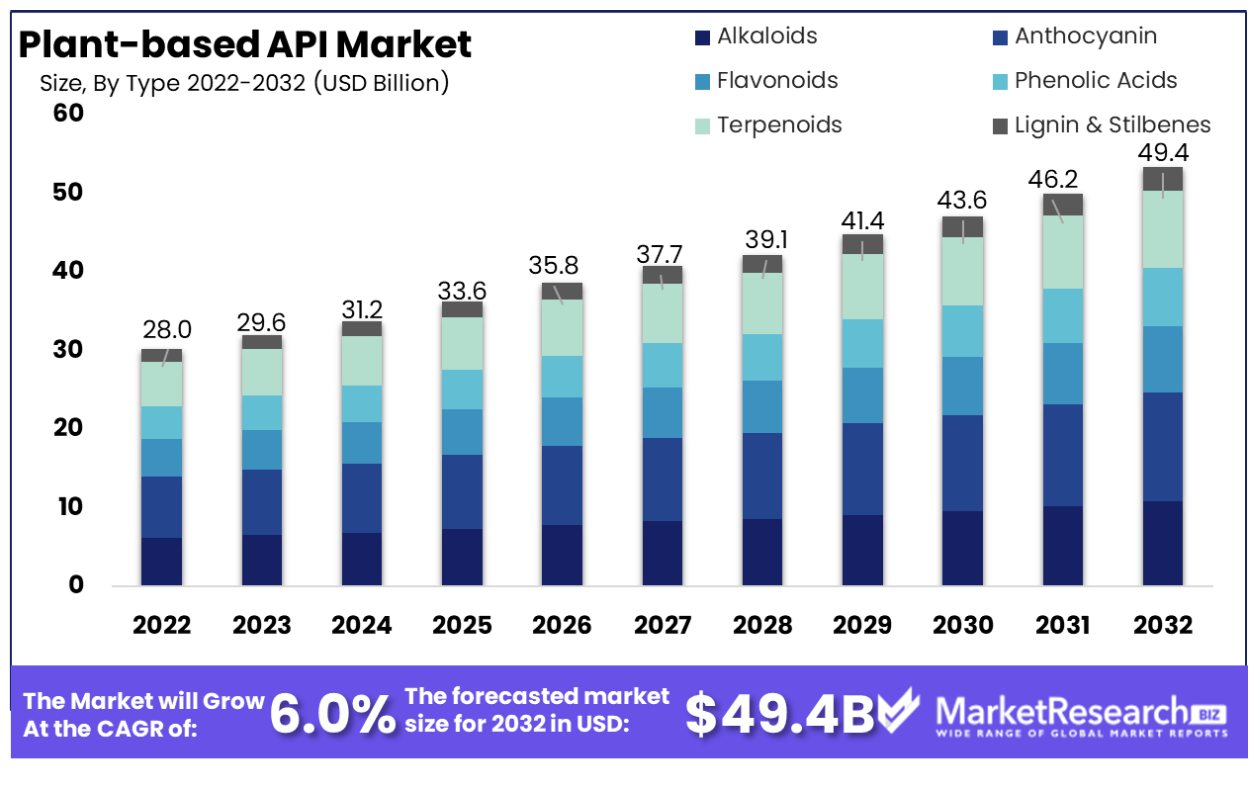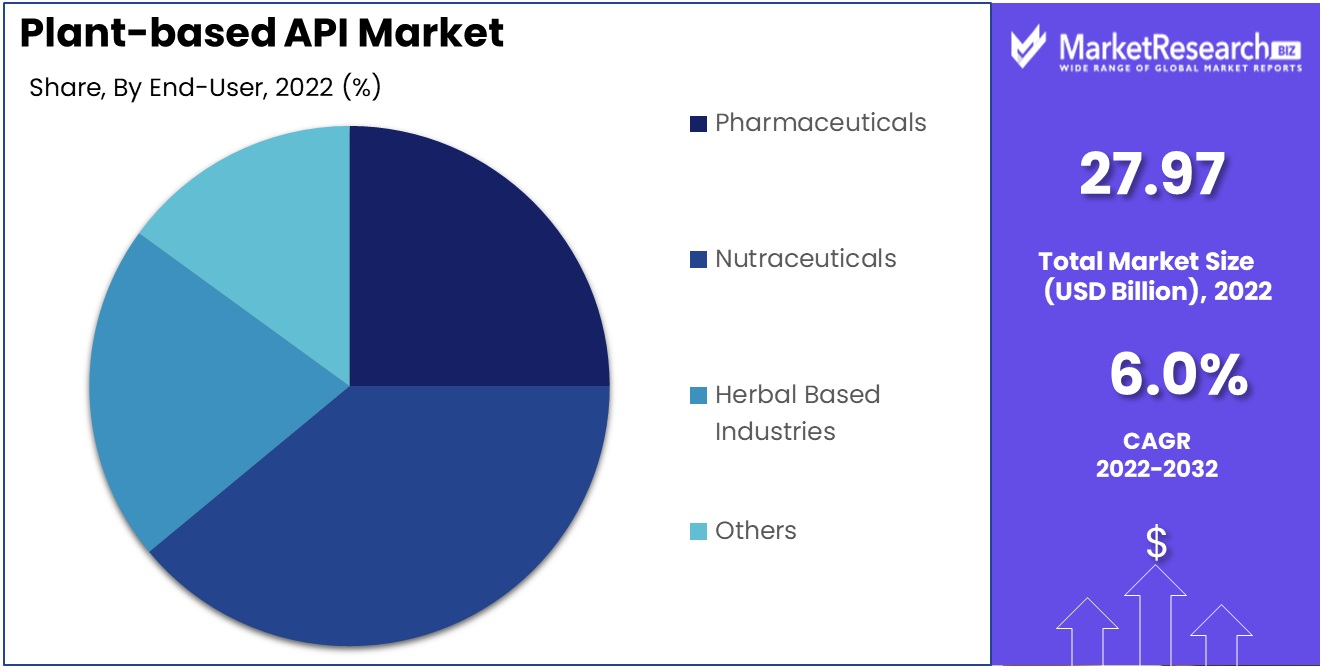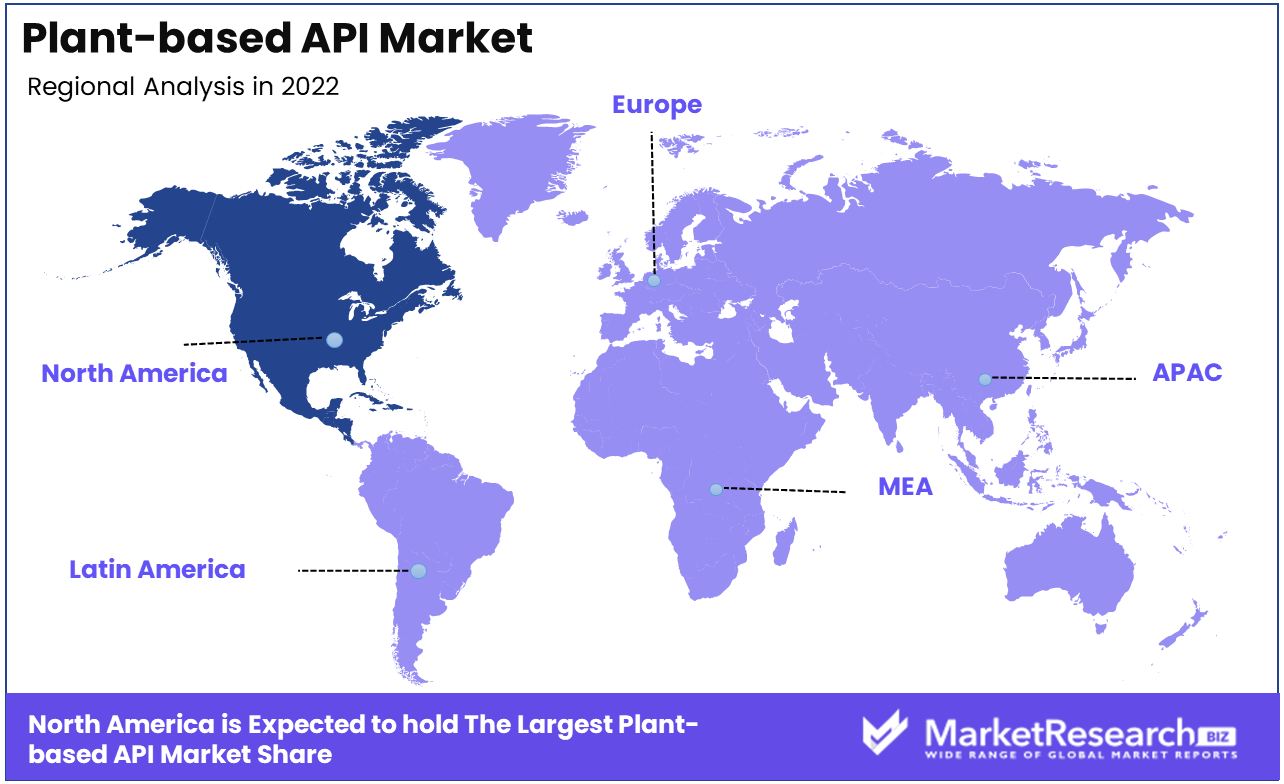
Plant-based API Market By Type(Alkaloids, Anthocyanin, Flavonoids, Phenolic Acids, Terpenoids, Lignin & Stilbenes, Others), By End-use(Pharmaceuticals, Nutraceuticals, Herbal Based Industrie, Others) By Region And Companies - Industry Segment Outlook, Market Assessment, Competition Scenario, Trends, And Forecast 2023-2032
-
42369
-
Jan 2022
-
178
-
-
This report was compiled by Correspondence Linkedin | Detailed Market research Methodology Our methodology involves a mix of primary research, including interviews with leading mental health experts, and secondary research from reputable medical journals and databases. View Detailed Methodology Page
-
Quick Navigation
The plant-based API market size is predicted to reach approximately USD 49.4 Bn by 2032, from a valuation of USD 27.97 Billion in 2022, growing at a CAGR of 6.0% during the forecast period from 2023 to 2032.

Plant-based APIs (application programming interfaces) allow software developers to access plant data and capabilities through a standardized interface. These APIs provide a software abstraction layer to simplify interactions with complex plant systems and data.
For example, an API could expose a plant’s real-time operational data or control interfaces in a simple, consistent way. This enables developers to quickly build applications that can monitor, analyze, or even optimize plant equipment performance.
The Plant-based API Market is expected to experience significant growth in the coming years driven by several key factors. Firstly, there is an increasing demand for plant-based and vegan medications as more consumers adopt plant-based lifestyles and desire cruelty-free and environmentally sustainable products. This is expanding the potential customer base for players in the Plant-based API Market.
In August 2023, Sprout Organic, an infant formula startup, secured a new distribution deal with Australian Pharmaceutical Industries (API). As a result of this partnership, Sprout Organic's products will be available in Soul Pattinson and Priceline Pharmacies. They emphasized the company's commitment to making plant-based and allergy-friendly nutrition accessible to more families. The distribution deal signifies a strategic move by API to offer diverse and healthy options for Australian families in the baby category.
Moreover, advancements in biotechnology and fermentation processes are enabling more efficient and cost-effective development of plant-based active pharmaceutical ingredients (APIs). Companies are leveraging technologies like genetic engineering to optimize plant cell cultures and yields. This is making large-scale production of plant-based APIs increasingly viable.
Additionally, rising R&D investments by biopharmaceutical companies aimed at developing novel plant-made pharmaceuticals and biomarkers are fueling further innovation in the Plant-based API Market. Government incentives and funding for plant-biotechnology research also play a key role here.
In April 2023, IFF launched VERDIGEL™ SC, a pectin-based technology for vegan soft gel innovation, catering to the increasing demand for carrageenan-free products in various markets. This addresses the growing preference for vegan supplements globally. Softgels are gaining popularity in the nutraceutical and supplement sectors, but they pose challenges in manufacturing, such as strength and stability. It is designed to help manufacturers transition to plant-based alternatives without compromising performance or quality.
Moreover, On February 28, 2022, Paraveganio became the world's first medicinal product to be registered with the Vegan Trademark, according to The Vegan Society. Developed by the German pharmaceutical company Axunio, Paraveganio is a vegan-certified paracetamol, a widely used painkiller. Unlike conventional paracetamol, Paraveganio does not contain animal-derived ingredients, specifically avoiding the use of magnesium stearate from animal sources.
In summary, major growth drivers for the Plant-based API Market include rising consumer demand, technological advancements increasing production efficiency, and intensive R&D activities leading to new product development. The expanding application scope of plant-based APIs beyond conventional uses is expected to create lucrative opportunities in this market.
Driving Factors
Rising Interest in Plant-Based Products Spurs Market Growth
The increasing awareness and interest in plant-based products, combined with the need for eco-friendly and sustainable alternatives, are significantly driving the growth of the Plant-based API (Active Pharmaceutical Ingredient) Market. This trend is fueled by a growing consumer preference for natural and organic products perceived as safer and healthier compared to synthetic alternatives.
The shift towards plant-based APIs aligns with the broader move towards sustainability in various sectors, including pharmaceuticals. Consumers and manufacturers are increasingly recognizing the environmental benefits of plant-based ingredients, such as reduced carbon footprint and sustainable sourcing. This growing awareness and preference for eco-friendly options are expected to continue, thereby sustaining the expansion of the plant-based API market.
Environmental Consciousness Boosts Plant-Based API Demand
The growing consumer awareness of the environmental impact of their choices is leading to a surge in demand for sustainable and environmentally friendly alternatives, significantly contributing to the growth of the Plant-based API Market. This shift reflects a broader societal move towards environmental responsibility, influencing purchasing decisions across various sectors.
In the pharmaceutical, food, and beverage industries, this trend translates to an increased preference for ingredients that are sustainably sourced and have a minimal ecological footprint. As environmental consciousness continues to rise among consumers, the demand for plant-based APIs is expected to grow, supported by a market that values sustainability and ecological well-being.
Diverse Industry Use Amplifies Plant-Based API Market
The development of the plant-based API market can be attributed to the increased use of plant extract ingredients in the pharmaceutical, beverage, and food industries. Plant-based APIs are gaining popularity due to their natural origin, perceived health benefits, and versatility in various applications.
In the pharmaceutical industry, they are being used for their therapeutic properties and lower risk of side effects. In the food and beverage sector, plant-based ingredients are preferred for their nutritional value and natural appeal. This wide-ranging application across diverse industries signifies a growing market that is adaptable and responsive to the evolving demands for natural, health-focused ingredients. The continued integration of plant-based APIs in various industries suggests a robust market growth trajectory, driven by their versatility and increasing consumer preference.
Restraining Factors
Stringent Regulatory Standards Limit Entry and Growth in Plant-Based API Market
The implementation of stringent quality and security standards by governments and regulatory bodies significantly limits the growth of the plant-based Active Pharmaceutical Ingredients (APIs) market. These regulations, essential for ensuring the safety and efficacy of pharmaceutical products, demand rigorous compliance from manufacturers.
For new market players, meeting these standards can be particularly challenging, involving substantial investment in quality control, documentation, and facilities that adhere to regulatory requirements. This high barrier to entry restricts the number of competitors in the market and can slow down innovation and market expansion, as companies may be deterred by the complexities and costs associated with compliance.
Pests, Diseases, and Environmental Stresses Impact Plant-Based API Supply
Pests, diseases, and environmental stresses present significant risks to the cultivation of plants used for APIs, affecting the market's growth. These challenges can lead to reduced yields or even total loss of harvests, directly impacting the availability and cost of raw materials necessary for API production.
The reliance on agricultural outputs for these APIs makes the supply chain vulnerable to fluctuations in plant health and environmental conditions. This vulnerability can lead to inconsistencies in supply, quality, and pricing, posing challenges for manufacturers in maintaining steady production and meeting market demand. The unpredictability associated with agricultural sourcing is a notable constraint in the plant-based API market.
Plant-based API Market Segmentation Analysis
By Type
Alkaloids, as the dominant type in the plant-based API (Active Pharmaceutical Ingredient) market, hold a significant position due to their extensive therapeutic properties and broad application in pharmaceuticals. Known for their potent pharmacological effects, alkaloids like morphine, quinine, and atropine have long been used in medicine for pain relief, malaria treatment, and as muscle relaxants, respectively. The efficacy of these compounds in treating various ailments, combined with ongoing research into their potential new therapeutic uses, ensures their continued market dominance.
Anthocyanins and flavonoids are recognized for their antioxidant properties, finding applications in anti-inflammatory and cardio-protective drugs. Phenolic acids, known for their anti-carcinogenic properties, are gaining traction. Terpenoids, with diverse structures, find use in a range of pharmaceutical applications. Lignin and stilbenes, though less common, contribute to the market with specific health benefits. Each of these types adds to the diversity and growth of the plant-based API market by offering unique therapeutic benefits.
By End-use
The pharmaceutical sector is the primary end-user of plant-based APIs, driven by the increasing demand for natural and effective drug formulations. Plant-based APIs are integral in producing a variety of medications, including analgesics, anti-infectives, and anti-cancer drugs. Their role in the development of new drugs, especially in the realm of natural and holistic medicine, underscores their market dominance. The trend towards plant-based ingredients in pharmaceuticals, driven by patient preference for natural treatments, supports this segment's growth.

Nutraceuticals leverage plant-based APIs for health supplements and functional foods. Herbal-based industries utilize these compounds in various wellness and personal care products. Other end-uses include research applications and alternative medicine. These segments, while smaller compared to pharmaceuticals, are growing due to the rising popularity of health and wellness trends.
Plant-based API Industry Segments
By Type
- Alkaloids
- Anthocyanin
- Flavonoids
- Phenolic Acids
- Terpenoids
- Lignin & Stilbenes
- Others
By End-use
- Pharmaceuticals
- Nutraceuticals
- Herbal Based Industries
- Others
Plant-based API Market Growth Opportunities
Rising Prevalence of Chronic Diseases Drives Growth in Plant-based API Market
The increasing prevalence of chronic conditions such as cancer, heart disease, and diabetes is a major factor driving the growth of the plant-based Active Pharmaceutical Ingredient (API) market. As these diseases become more common, there is a heightened demand for innovative and efficient therapies.
Plant-based APIs, known for their natural therapeutic properties and fewer side effects, are being increasingly sought after in the development of new medications. This trend is underpinned by a growing preference for natural and holistic treatment options among patients and healthcare providers, suggesting a significant expansion potential for the plant-based API market in addressing these chronic health challenges.
Plant-based API Market Regional Analysis
North America Dominates with 34.13% Market Share
North America's significant 34.13% share in the Plant-based API (Active Pharmaceutical Ingredient) Market is primarily driven by the region's strong pharmaceutical industry and growing preference for natural and holistic healthcare solutions. The United States, in particular, has a robust demand for plant-based therapeutics, fueled by an increasing awareness of the benefits of natural products over synthetic alternatives. Additionally, substantial investments in research and development in the pharmaceutical sector and the presence of major pharma companies in the region contribute to this market dominance.

The market dynamics in North America are influenced by the region’s advanced technological capabilities in drug development and a strong regulatory framework that supports the introduction of plant-based medicines. The growing consumer interest in organic and natural products, along with the rising prevalence of chronic diseases, further drives the demand for plant-based APIs. Moreover, collaborations between pharmaceutical companies and research institutions in exploring plant-derived compounds for therapeutic applications boost market growth.
Europe Has Emphasis on Natural and Alternative Medicines
Europe’s plant-based API market is driven by the region's emphasis on natural and alternative medicines. European countries have a long history of using herbal remedies, and this tradition, combined with modern pharmaceutical practices, supports the market. The strong regulatory environment in the EU, which ensures the safety and efficacy of plant-based APIs, further contributes to market growth.
Asia-Pacific's Rich Biodiversity and Traditional Medicine
In Asia-Pacific, the plant-based API market benefits from the region's rich biodiversity and long-standing tradition of herbal medicine. Countries like China and India, with their wealth of medicinal plants and historical knowledge of herbal remedies, play a significant role in the market. The growing pharmaceutical sector in the region, along with increasing investments in drug discovery and development using plant-based compounds, positions Asia-Pacific as a key emerging market in this sector.
Plant-based API Market Industry By Region
North America
- The US
- Canada
Europe
- Germany
- France
- The UK
- Spain
- Italy
- Russia
- Netherlands
- Rest of Europe
Asia-Pacific
- China
- Japan
- South Korea
- India
- New Zealand
- Singapore
- Thailand
- Vietnam
- Rest of Asia Pacific
Latin America
- Brazil
- Mexico
- Rest of Latin America
Middle East & Africa
- South Africa
- Saudi Arabia
- UAE
- Rest of the Middle East & Africa
Plant-based API Market Key Player Analysis
In the Plant-based Active Pharmaceutical Ingredients (API) Market, the listed companies are key players driving innovation and sustainability. Roquette Frères and Centroflora lead in providing plant-derived APIs, underscoring the market's focus on natural and eco-friendly pharmaceutical ingredients. Their emphasis on sustainable sourcing and processing methods reflects the industry's shift towards green chemistry.
Arboris and BASF SE, known for their chemical expertise, contribute significantly to the market with specialized plant-based sterols and other compounds, demonstrating the diverse applications of plant-derived substances in pharmaceuticals. Kothari Phytochemicals & Industries Ltd and Evonik Industries AG, focusing on a broad range of plant-based APIs, underscore the industry's capacity for large-scale production and innovation.
Brains (Brains Bioceutical) and Indo Phytochem Pharmaceuticals, with their niche offerings, cater to specific demands within the plant-based API market, showcasing the industry's adaptability and responsiveness to evolving pharmaceutical needs. HimPharm.com and Cargill, Incorporated, though differing in scale, contribute to the market through their specialized botanical extracts and ingredients.
Medipure Pharmaceuticals Inc. and Novartis AG, along with other pharmaceutical giants like Sanofi SA, GlaxoSmithKline plc, and F. Hoffmann-La Roche AG, are integrating plant-based APIs into their drug development processes, highlighting the growing mainstream acceptance of plant-derived ingredients in the pharmaceutical industry.
Collectively, these companies not only drive the Plant-based API Market's growth but also represent diverse strategies - from focusing on sustainable sourcing and processing to integrating plant-based ingredients in mainstream pharmaceuticals - essential for the advancement and acceptance of plant-derived APIs in the global market.
Major Market Players in the Plant-based API Market
- Roquette Frères
- Arboris
- Centroflora
- BASF SE
- Kothari Phytochemicals & Industries Ltd
- Evonik Industries AG
- Brains (Brains Bioceutical)
- Indo Phytochem Pharmaceuticals
- HimPharm.com
- Cargill, Incorporated
- Medipure Pharmaceuticals Inc.
- Novartis AG
- Sanofi SA
- GlaxoSmithKline plc
- F. Hoffmann-La Roche AG
Recent Development
- In 2019, Sanofi SA announced a USD 640 million (€600 million) investment in its French production sites, with a focus on plant-based APIs for the treatment of rare diseases. The investment will support the development of new plant-based technologies, including the use of algae and other microorganisms to produce APIs. Sanofi has also invested in the production of plant-based insulin, which was approved by the FDA in 2020.
- Novartis has also made significant investments in plant-based APIs in recent years, with a focus on the use of plant cell culture technology. In 2020, Novartis announced a collaboration with Canadian biotech company PlantForm Corporation to develop plant-based biosimilars for the treatment of rare diseases. Novartis has also invested in the development of plant-based vaccines, including a collaboration with Boston-based biotech company VBI Vaccines to develop a plant-based vaccine for COVID-19.
- In 2020, Amyris, a California-based biotechnology company, announced that it had successfully produced a plant-based version of the anti-malarial drug artemisinin. The company used a proprietary yeast strain to produce the drug, which was then licensed to pharmaceutical companies for further development and commercialization.
Report Scope
Report Features Description Market Value (2022) USD 27.97 Billion Forecast Revenue (2032) USD 391.8 Billion CAGR (2023-2032) 6.0% Base Year for Estimation 2022 Historic Period 2016-2022 Forecast Period 2023-2032 Report Coverage Revenue Forecast, Market Dynamics, COVID-19 Impact, Competitive Landscape, Recent Developments Segments Covered By Type(Alkaloids, Anthocyanin, Flavonoids, Phenolic Acids, Terpenoids, Lignin & Stilbenes, Others), By End-use(Pharmaceuticals, Nutraceuticals, Herbal Based Industrie, Others) Regional Analysis North America - The US, Canada, Europe - Germany, France, The UK, Spain, Italy, Russia, Netherlands, Rest of Europe, Asia-Pacific - China, Japan, South Korea, India, New Zealand, Singapore, Thailand, Vietnam, Rest of Asia Pacific, Latin America - Brazil, Mexico, Rest of Latin America, Middle East & Africa - South Africa, Saudi Arabia, UAE, Rest of Middle East & Africa Competitive Landscape Roquette Frères, Arboris, Centroflora, BASF SE, Kothari Phytochemicals & Industries Ltd, Evonik Industries AG, Brains (Brains Bioceutical), Indo Phytochem Pharmaceuticals, HimPharm.com, Cargill, Incorporated, Medipure Pharmaceuticals Inc., Novartis AG, Sanofi SA, GlaxoSmithKline plc, F. Hoffmann-La Roche AG Customization Scope Customization for segments, region/country-level will be provided. Moreover, additional customization can be done based on the requirements. Purchase Options We have three licenses to opt for Single User License, Multi-User License (Up to 5 Users), Corporate Use License (Unlimited User and Printable PDF) -
-
- Roquette Frères
- Arboris
- Centroflora
- BASF SE
- Kothari Phytochemicals & Industries Ltd
- Evonik Industries AG
- Brains (Brains Bioceutical)
- Indo Phytochem Pharmaceuticals
- HimPharm.com
- Cargill, Incorporated
- Medipure Pharmaceuticals Inc.
- Novartis AG
- Sanofi SA
- GlaxoSmithKline plc
- F. Hoffmann-La Roche AG




